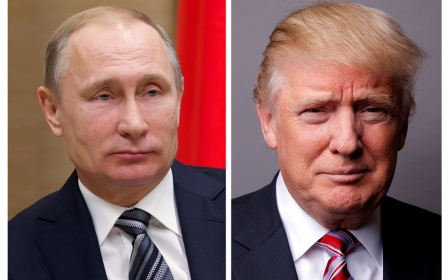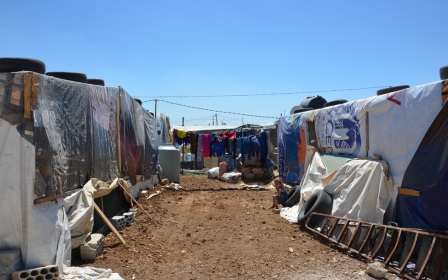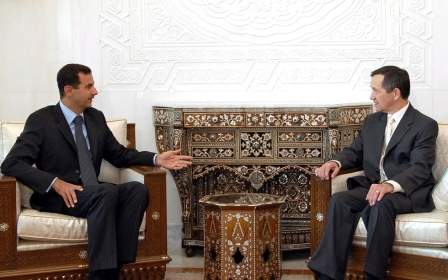Syrian rebels withdraw from Astana peace talks on day one
Syrian rebels have said they are suspending their participation in the latest round of peace talks, which began in Kazakhstan on Wednesday morning.
The warring sides had been due to discuss a plan to create safe zones.
"The rebel delegation is suspending the meetings because of the violent air strikes on civilians," a rebel source in the Kazakh capital Astana told AFP. "The suspension will continue until shelling stops across all Syria."
A Kazakh Foreign Ministry official said that they expect the Syrian armed opposition to return to the table on Thursday.
"I hope that tomorrow the opposition will again take part (in the talks)," Aidarbek Tumatov, a department chief at the ministry, told reporters in the Kazakh capital.
I hope that tomorrow the opposition will again take part
- Aidarbek Tumatov, Kazakh foreign ministry official
Syrian government and rebel delegations had gathered for the start of a fourth round of talks sponsored by regime backers Russia and Iran and opposition supporter Turkey.
The latest round of negotiations began with a series of bilateral meetings and was set to focus on a Russian plan to establish "de-escalation zones" across the war-torn country.
A source close to the opposition provided AFP with an Arabic-language version of a proposal drafted by Russia. An opposition official confirmed it was being discussed on Wednesday.
The proposal calls for the creation of "de-escalation" areas in rebel-held territory in the northwestern province of Idlib, in parts of Homs province in the centre, in the south, and in the opposition enclave of Eastern Ghouta near Damascus.
The aim is to "put an immediate end to the violence" and "provide the conditions for the safe, voluntary return of refugees". The designated zones would also see the immediate delivery of relief supplies and medical assistance.
According to the draft, "security zones" would be created around them, with checkpoints and monitoring centres to be manned by government troops and rebel fighters.
Military units from unspecified "observer countries" could also be deployed.
The document named Turkey, Iran and Russia as guarantors of the agreement and pledged that they would create a "joint working group" within five days of the document being signed by the warring parties.
Car bomb in Azaz
In Syria itself, a car bomb blast killed at least five people in the rebel-held town of Azaz by the Turkish border on Wednesday, the Syrian Observatory for Human Rights said.
The dead were four civilians and a police officer, the Britain-based monitor said. It added that the toll could rise because a number of those wounded were in serious condition.
The blast littered the ground with debris and started an enormous fire that sent thick clouds of black smoke billowing into the air. Civil defence workers and residents tried to put out the blaze.
The dead were placed in black body bags, next to which grief-stricken mourners sat weeping or staring in shock.
The blast hit near a mosque and the headquarters of the opposition's provisional government, formed in November 2013, which administers some areas under rebel control.
Douma aid convoy
Meanwhile in besieged Douma, an aid convoy of food and medical supplies reached the town for the first time since October, the International Committee of the Red Cross (ICRC) said.
Along with the United Nations and the Syrian Arab Red Crescent, the ICRC went into Douma with 51 trucks carrying aid for 35,000 people, it said on Twitter.
A UN official in Syria said the convoy had entered late on Tuesday night, carrying food rations, health supplies and other emergency items, and that the mission was still ongoing.
The UN said in March that fighting around Syria's capital, Damascus, had cut 300,000 people off from aid in the rebel-held suburbs of eastern Ghouta, which have been under siege by government forces since 2013.
Food stocks are dwindling and informal supply routes were cut in the pocket of farms and towns near Damascus. Douma has not received any UN aid since October and supplies have not entered Kafr Batna since last June, the UN said.
UN Syrian humanitarian adviser Jan Egeland, who had called on the warring sides to allow aid in, said last month that it was "very, very urgent" to get aid into eastern Ghouta.
New MEE newsletter: Jerusalem Dispatch
Sign up to get the latest insights and analysis on Israel-Palestine, alongside Turkey Unpacked and other MEE newsletters
Middle East Eye delivers independent and unrivalled coverage and analysis of the Middle East, North Africa and beyond. To learn more about republishing this content and the associated fees, please fill out this form. More about MEE can be found here.




